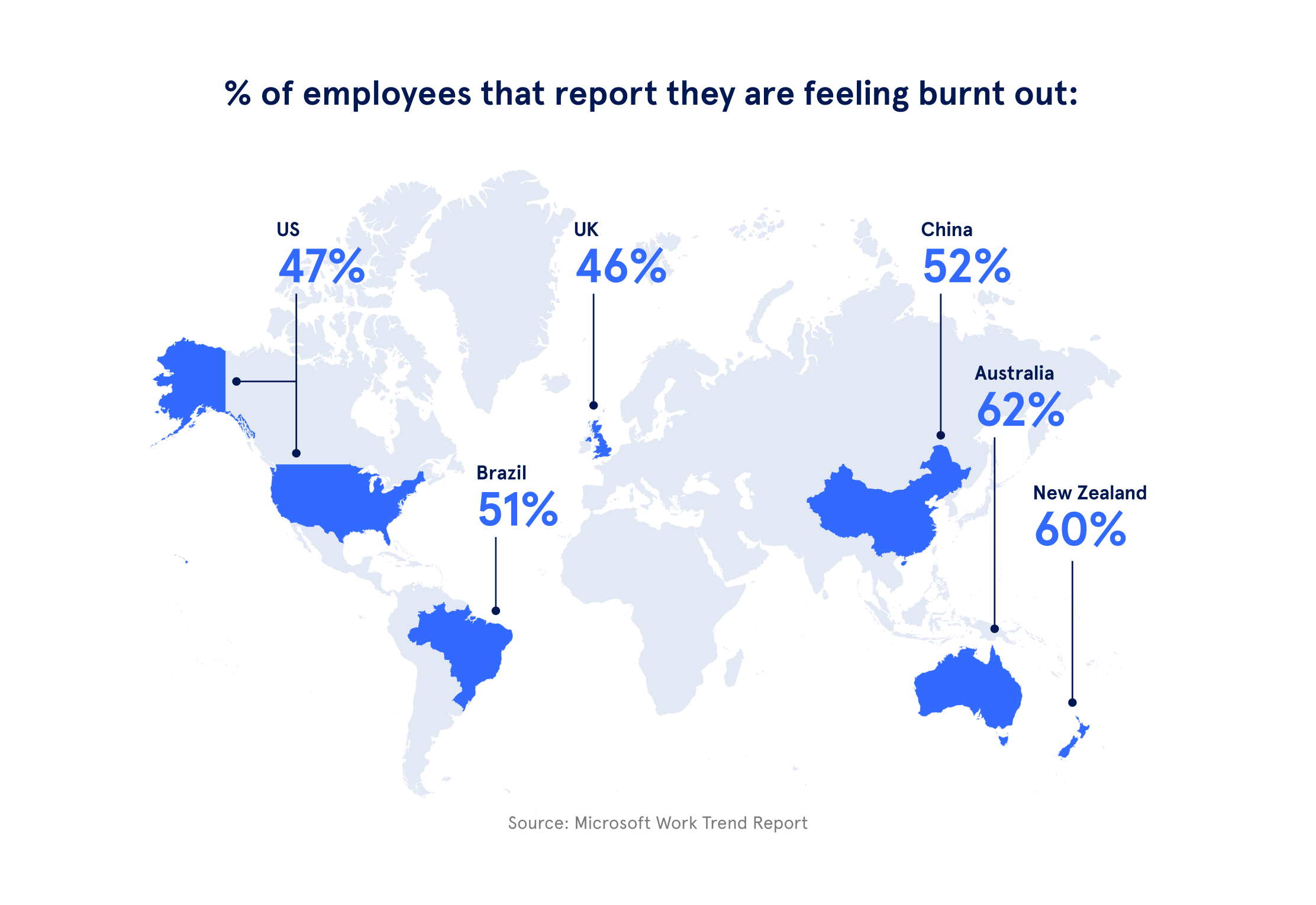More than 54%* of employees say access to wellbeing programs is a key consideration when looking for a new role. That’s according to a 2023 survey of Australian and New Zealand employees, commissioned by Sonder and featured in our brand new report.
With nearly three-quarters of employees on the hunt for their next challenge, it presents a unique opportunity for businesses to make employee health, wellbeing and safety a key priority in their Employee Value Proposition (EVP).
Our new guide shares data from Sonder and Culture Amp, and features expert advice on how to create a compelling EVP. Download it here, or keep reading for a preview of how you can bring employee health and safety into the spotlight to win the war for talent.
The growing war for talent
Coined by McKinsey back in 1997, the war for talent refers to the challenges in attracting and retaining employees.
In 2024, this is more relevant than ever as we know that workers are no longer putting up with demanding workloads, poor working conditions and a lack of holistic health support, and are actively seeking out companies that put their health, safety and wellbeing first.
Sonder’s research indicates 47%* of Australian and New Zealand employees aren’t satisfied with the wellbeing support offered by their current employer, leading many to look elsewhere.

Exacerbating the issue is talent shortage, with employers struggling to get applicants to apply at all. As Steve Grace, CEO and founder of The Nudge Group explains in our guide, “For junior roles, we’re seeing very few candidates; 5-25 people applying. This is driven by a belief in startups, side hustles, content creation culture, and working multiple part-time roles that fit into their life.”
Staff retention is also a major challenge. From lack of recognition to limited career progression opportunities, employees are not afraid to leave their current role for a company that aligns with their values, offers meaningful flexibility and supports them to bring their best self to work.
Unfortunately, the traditional approach to employee wellbeing isn’t working for many employees. Sonder’s research revealed one-third of employees* aren’t aware of what wellbeing support is offered in their workplace, with just 20% reporting to truly understand the support on offer and how to access it.
With almost half of the 2,000 employees surveyed “often” or “always” experiencing burnout and exhaustion in the past 12 months, such support is critical to avoid high turnover rates.

As Ben Cividin, People Manager, Charter Hall advises, “Increasingly, talent will move on from organisations if they don’t feel like the whole of the offering is aligned to what they want…increasingly that [35 and under] cohort really wants to understand: ‘Does the organisation I’m joining have my best interests at heart? Not only are they going to give me the creative stuff, but are they actually going to create an environment where I can thrive and do my best work?’”
Employee stress levels are going unaddressed
In 2023, only 47% of employees globally agreed that they rarely feel overstressed at work, according to research from Culture Amp† featured in our report. Stress levels among employees in APAC have stayed steady at 47% from 2023 to 2024.
Employers have a powerful role in supporting employees’ stress levels through access to self-serve resources, 1:1 counselling sessions, and company-wide initiatives. And this can have huge benefits for the individual and business alike.
According to the Culture Amp data, at companies who score in the top 25% for ‘I rarely feel overstressed by my work’:
- Commitment to stay is 12% higher
- Motivation is 12% higher
- Willingness to recommend the company is 8% higher

“When employees are less stressed, and feel more positively toward their work, they’re more likely to stay at the company, recommend others should work there and be more motivated in their own work.”
Heather Walker, Culture Amp Senior Data Journalist
The risks of not investing in your EVP
PwC’s Future of Work Report surveyed over 1,800 Australian workers and found that 38% plan to leave their current employer in the next 12 months. And yet, 48% of business leaders have no plans to redesign their employee value proposition (EVP).
For job seekers, the most attractive employers are those prioritising wellbeing programs and holistic health support to meet the needs of modern workers. Research from Gartner shows organisations that effectively deliver on their EVP can decrease annual employee turnover by 69%.
“A really great EVP, when done properly and communicated well internally, will help reinforce to the people that work for you why they should stick around. If you’re reminding people why it is worth their commitment, it’ll help with retention and keep people engaged and performing.”
Mark Puncher, CEO of Employer Branding Australia
Increased recruitment costs are another key risk, with estimates showing that the average cost to recruit an employee in Australia has grown to $23,000 per candidate-up $10,000 from the previous year.
But the benefits of investing in employee health are clear: findings from the Australian Government’s Productivity Commission, which shows for every dollar a business spends on mental health programs, they can expect anywhere from $1 and $4 in return.
As The HR Director states, “Nearly 70% of people aged 18 to 34 would change companies for better benefits…Offering comprehensive healthcare and wellness benefits can elevate EVP. In turn, that boosts your company in the eyes of both your current staff and prospective talent.”
Download the report on how to build a winning Employee Value Proposition
Discover the emerging workplace trends that show how companies are winning the war for talent. Along with the latest data highlighting the benefit of building a winning EVP, you’ll walk away with practical strategies to strengthen your EVP to attract and retain talent.
Our ‘Winning The War For Talent’ guide shares:
- Survey data from 2,000+ employees and Sonder customers
- The risks of not investing in your EVP in a competitive job market
- How building a strong EVP can lower employee turnover, improve return on investment, and streamline recruitment
- Expert commentary on strategies to stay ahead of the competition with a strong EVP and communicate your offering with employer branding

Download now for practical advice on creating a compelling EVP that enables your people to thrive at work.
*Sonder data: September 2023, McGregor Tan survey of employees in Australia and New Zealand who were working a minimum of 30 hours per week.
† Culture Amp data: Live global Culture Amp data, covering 1.7m employees globally, supplied June 2024.
About Sonder
Sonder is a technology company that helps organisations improve the wellbeing of their people so they perform at their best. Our mobile app provides immediate, 24/7 support from a team of safety, medical, and mental health professionals – plus onsite help for time-sensitive scenarios. Accredited by the Australian Council on Healthcare Standards (ACHS), our platform gives leaders the insights they need to act on tomorrow’s wellbeing challenges today.



